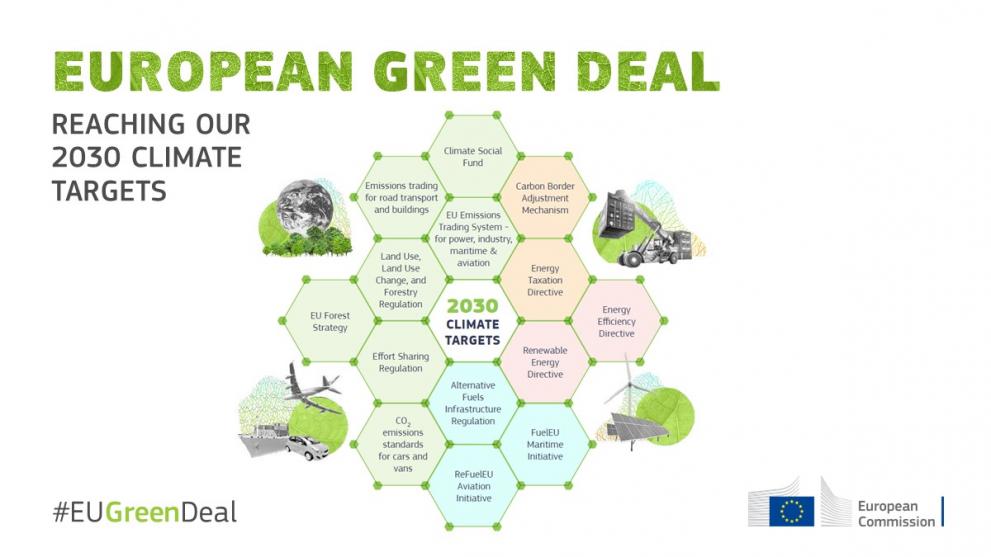
Today, on 14 July 2021, the European Commission unveiled a massive legislative package on climate and energy proposals to put the European Green Deal into action.
Better known as the ‘Fit for 55’, these proposals aim to make all sectors of the EU’s economy fit to meet the climate change challenge. They set the EU on a path to reach climate neutrality in a fair, cost-effective and competitive way by 2050. The intermediate target entails the reduction of net greenhouse gas emissions by at least 55% by 2030, compared to 1990 levels. More information on the launch of the Fit for 55 can be found here.
Hydrogen as the key technology for meeting our 2030 climate and energy targets
The use of innovative energy carriers such as hydrogen, particularly coming from renewable electricity, will play a key role in the European Green Deal. By using the potential of green hydrogen, we can successfully decarbonise high-emission industries, aviation and other hard-to-abate sectors.
The 2030 targets include 40GW of renewable hydrogen electrolysers in the EU and 10 million tonnes of renewable hydrogen produced in the EU. The numerous research projects funded by the Fuel Cells and Hydrogen Undertaking (FCH JU) in the field of electrolysis and demonstration projects will contribute significantly to the advancement of these key technology and increase the market viability and commercialisation of fuel cell and hydrogen technologies.
The 2 directives on Renewable Energy and Energy Efficiency have will also have a major role to play in reaching the 55% emission reduction by 2030.
The revised Renewable Energy Directive promotes the use of renewable hydrogen by extending the EU-wide certification system for renewable fuels to include hydrogen by decarbonising industry and heavy-duty and long-distance transport, with concrete targets:
• 2.6% for renewable fuels of non-biological origin
• 50% renewable share in hydrogen consumption
The decarbonisation of transport sector is absolutely essential to ensure Europe’s transition to a carbon-neutral economy and encompasses all aspects of hydrogen utilisation in transportation, in particular for heavy-duty vehicles. The CO2 standards for cars and vans therefore set technology neutral targets to reduce emissions by 2030 and by 2035.
The Alternative Fuel Infrastructure Regulation will also support the deployment of alternative fuels infrastructure, including refuelling points for hydrogen. One refuelling station will be available every 150 km along the TEN-T core network and in every urban node.
Furthermore, renewable hydrogen will make a substantial contribution to reducing emissions from shipping and our FCH JU-funded projects have taken a leading role within the development of hydrogen solutions in the maritime sector. The FuelEU Maritime proposal covers all renewable and low-carbon fuels in maritime transport, including decarbonised hydrogen and decarbonised hydrogen-derived fuels (including methanol and ammonia).
As regards the EU Emissions Trading System Proposal (EU TES), it will include the production of hydrogen with electrolysers under the EU emissions trading scheme, making renewable and low-carbon facilities eligible for free allowances.
Lastly, the Energy Taxation Directive sets preferential tax rates for the use of renewable and low-carbon hydrogen for end-consumers.
You can find an overview on the proposal relating to hydrogen in the Hydrogen fact sheet here.
With our unique public-private partnership, we have worked to develop and further promote hydrogen technologies in Europe.
In our new Clean Hydrogen Partnership to be launched by the end of the year, we are determined to double the stakes, because we are convinced that constant innovation will further drive the hydrogen revolution. The Clean Hydrogen Partnership will be a key instrument in the implementation of the European Hydrogen Strategy and will accelerate the development and deployment of a European value chain for clean hydrogen technologies. For more information on Clean Hydrogen Partnership, joins us for the second edition of the European Hydrogen Week, from 29 November to 3 December.
Details
- Publication date
- 14 July 2021
- Author
- Fuel Cells and Hydrogen 2 Joint Undertaking
